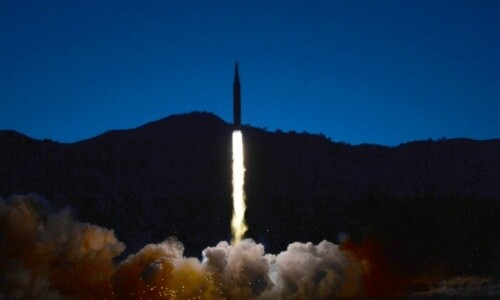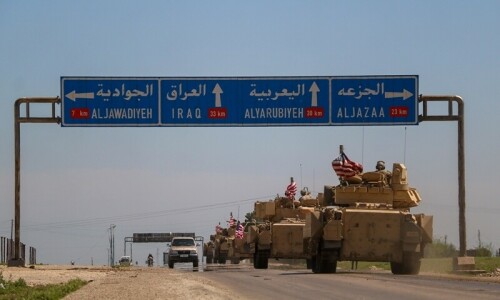WASHINGTON: The United States confirmed on Monday it would resume sales of offensive weapons to Saudi Arabia, as concerns over human rights in the kingdom’s Yemen war give way to US hopes for it to play a role in resolving the conflict in Gaza.
More than three years after imposing limits on human rights grounds over Saudi strikes in Yemen, the State Department said it would return to weapons sales “in regular order, with appropriate congressional notification and consultation.” “Saudi Arabia has remained a close strategic partner of the United States, and we look forward to enhancing that partnership,” State Department spokesman Vedant Patel told reporters.
US President Joe Biden took office in 2021 pledging a new approach to Saudi Arabia that emphasised human rights, and immediately announced that the administration would only send “defensive” weaponry to the longtime US arms customer. The United States is again hoping for support from Arab partners as Iran threatens another reprisal against Israel over the killing in Tehran of Hamas’s political leader, Ismail Haniyeh.
The step came after thousands of civilians — including children — were estimated to be killed in Saudi-led airstrikes against Houthi rebels, who have taken over much of Yemen.
Washington hopes for support from Arab partners as Iran threatens another reprisal against Israel
Geopolitical considerations have, however, changed markedly since then. The United Nations, with US support, brokered a truce in Yemen in early 2022 that has largely held.
Since the truce, “there has not been a single Saudi airstrike into Yemen and cross-border fire from Yemen into Saudi Arabia has largely stopped,” Patel said.
“The Saudis since that time have met their end of the deal, and we are prepared to meet ours,” Patel said.
Saudi role in Gaza crisis
It is now the United States, Britain and recently Israel that have been striking Houthi targets in Yemen, with Saudi Arabia content to watch from the sidelines.
The Houthis have been firing missiles at commercial ships in the vital Red Sea in professed solidarity with Palestinians.
In a bid to find a long-term solution, US Secretary of State Antony Blinken has repeatedly traveled to Saudi Arabia to discuss a package of US incentives if the kingdom recognises Israel.
Saudi Arabia has sought US security guarantees, a continued flow of weapons and potentially a civilian nuclear deal if it normalises with Israel.
Israeli Prime Minister Benjamin Netanyahu has made normalisation with Arab states a top goal and no prize would be as big as Saudi Arabia. But Saudi Arabia says it cannot act without progress on a Palestinian state, an idea pushed by the Biden administration as it seeks a diplomatic way out of the Gaza conflict, but bitterly opposed by Netanyahu and his far-right allies.
Published in Dawn, August 13th, 2024














































Dear visitor, the comments section is undergoing an overhaul and will return soon.